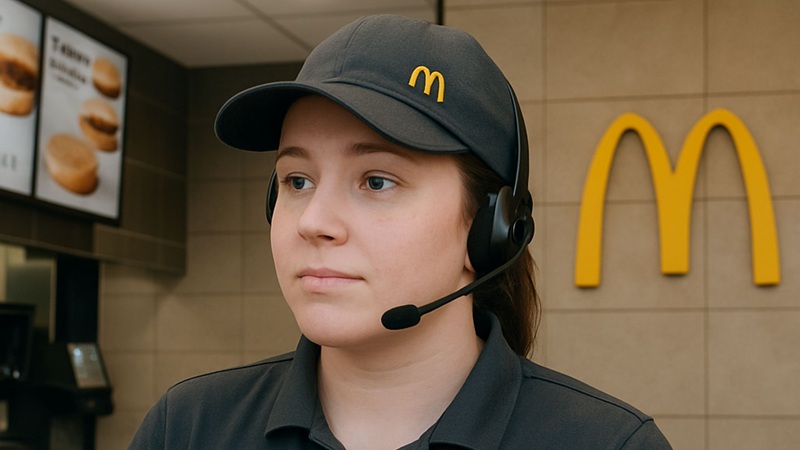Introduction
One would think that in a society where customer service is supposed to be friendly and welcoming, polite conduct from consumers, like a basic “hello”, would be valued and rewarded. A McDonald’s worker’s unexpected finding, meanwhile, has generated debate and interest. Many are left puzzled by a viral article called “McDonald’s worker exposes that customers who greet them might be ignored.” The statement challenges conventional wisdom and starts a discussion on the reality of fast food employment, the psychology of consumer interaction, and the pressures service sector workers experience.
Let us investigate this shocking assertion, consider its implications, and know why such a behaviour could exist behind the counter of one of the world’s largest fast-food chains.
McDonald’s Worker Reveals Customers Who Greet Them May Be Ignored: A Shocking Admission
A video recently surfaced on TikTok and other social media platforms where a McDonald’s worker made a surprising confession that greeting employees might not always earn you better service. In fact, the employee claimed that customers who say “hello” or “hi” before placing an order are more likely to be overlooked.
Quickly going viral, the clip was titled “McDonald’s worker exposes that customers who greet them might be overlooked.” It caused a huge range of reactions, with some people feeling sorry for the overworked workers and others calling the attitude rude and demoralising.
The employee in question said that during hectic times, greetings can be seen as time-wasters. Often under severe time limits, employees are taught to prioritise speed and efficiency. From the stressed employee’s viewpoint, a consumer’s friendly “hello” might be seen as a delay strategy.
This raises the question: Is fast food now so fast that politeness has become a hindrance?
The Fast-Food Culture: Efficiency Over Etiquette?
Grasping the internal culture and expectations in a location like McDonald’s helps one to better understand this phenomenon. Consistency and speed have helped the firm to build its reputation. Behind the counters, staff members are sometimes balancing several orders, time limits, quality criteria, and demanding consumers.
Even a little act of niceness could be misread in such a high-pressure context. Usually, the emphasis is on correctly placing the order, maintaining drive-thru times short, and preserving output. Workers are judged by speed measurements on how quickly they take orders, handle payments, and provide food.
When a McDonald’s employee says customers who greet them might be ignored, it is not always because of rudeness but rather because of training to give quick transactions priority over human contact. Although this does not excuse the conduct, it does help to explain why such a dynamic has developed.
Why Would a Greeting Be Ignored?
There are several factors at play that could lead to this unusual customer-service behavior:
- Mental Fatigue and Burnout: Many fast-food employees, including those at McDonald’s, put in long hours with little rest. Doing the same chores for hours might cause a kind of emotional numbness. Greetings may go unnoticed, not out of intent, but simply due to exhaustion.
- Scripted Interactions: Staff members are taught to follow a particular script asking for your order, recommending an upsell, verifying the order, and handling the payment. Especially during rush hours, deviations from this routine could confuse or delay the system.
- Perceived Inefficiency: Every second matters during peak hours. A basic “hello, how are you?” from a consumer could be interpreted as a possible conversation starter, which employees may not have time to engage.
- Emotional Detachment as a Coping Mechanism: Every day presents a struggle dealing with rude, impatient, or entitled consumers. With time, some employees could develop a distant attitude as a means of self-preservation.
These reasons provide a framework for understanding the shocking trend highlighted in the headline: McDonald’s worker reveals customers who greet them may be ignored.
Reactions From the Public
Unsurprisingly, the revelation sparked varied reactions online. Several users voiced unhappiness, claiming that kindness should not be punished. Others empathized with the worker, recognizing the demands and stress of fast-food jobs.
A few responses included:
- “So we’re at a point where being polite gets you ignored? That’s sad.”
- I worked at McDonald’s as well, and to be honest, occasionally I simply lacked the energy for small talk.
- What kind of world is it where saying “hello” is seen as something to be avoided?
Despite the mixed feedback, one thing was clear the viral moment sparked a much-needed conversation about how we treat service workers and what we expect from them in return.

Should Customers Change Their Behavior?
The core concern stemming from this viral statement, McDonald’s worker reveals customers who greet them may be ignored is whether this should influence how customers behave.
In reality, no one should feel discouraged from being polite. Kindness isn’t the issue here; it’s the structure within which workers operate. If anything, this scenario highlights systematic shortcomings in the training, treatment, and performance expectations of fast-food workers.
Rather than discouraging hellos, maybe McDonald’s and other comparable chains should re-evaluate their focus on speed over quality. A more human-centred approach might ease employee stress and foster better customer experiences.
What Can McDonald’s Do?
To address this problem, McDonald’s and other fast-food chains could:
- Encourage a Culture of Courtesy: Instead of prioritizing robotic efficiency, companies could train workers to balance speed with basic human interaction.
- Improve Working Conditions: Increasing mental well-being and lowering burnout could be achieved by more breaks, reasonable pay, and manageable hours.
- Reframe Performance Metrics: Think about qualitative factors, including employee involvement and customer happiness, in addition to time-tracking.
- Foster Empathy: Create programs that teach emotional intelligence and empathy to both customers and staff.
When a McDonald’s worker reveals that customers who greet them may be ignored, it shouldn’t be treated as an isolated or amusing fact. It should be a wake-up call for systemic change.
Conclusion
The viral discovery that McDonald’s employees uncover customers who greet them might be ignored has unearthed more than simply an eyebrow-raising remark. It emphasizes a more general problem of dehumanisation in the service sector, where speed sometimes comes before politeness and compassion.
Although it might seem paradoxical that a basic “hello” could cause one to be overlooked, the setting clarifies why such behaviour could happen. Yet, this does not mean that customers should stop being polite. On the contrary, it reinforces the need for kindness, understanding, and a reevaluation of how businesses train and support their staff.
As consumers, we should continue to greet service workers with warmth. And as a society, we must strive to build systems that don’t force employees to sacrifice human connection in the name of efficiency. Because, at the end of the day, no one should be ignored for being kind.









Leave a Reply